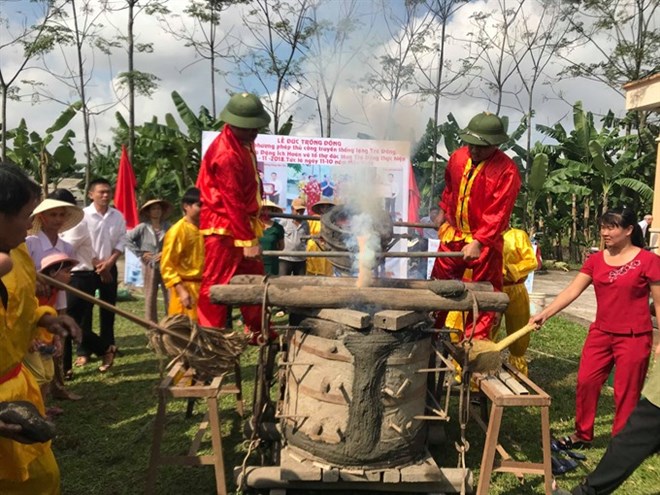
Bronze casting in Che Dong village in the central province of Thanh Hoa has officially received a certification recognising it as a National Intangible Cultural Heritage, making it the seventh local heritage to receive the title in the country.
Artisans from various workshops in Che Dong Village show off their bronze casting skills.(Photo: VNA).
The traditional handicraft and trade of Che Dong village have
existed for thousands of years and have been preserved and promoted to this day.
The trade comprises a sophisticated technical process
involving many stages, each of which uses different techniques like moulding,
mixing the compound, heating and casting.
Experience is often passed down through families and kept
secret from other villages. This is why Che Dong village is the only place in
Thanh Hoa province that has preserved the art.
All the bronze items they make are meticulously crafted by
hand.
Local artisans create items of worship, jars and particularly
drums. They created the biggest bronze drum in Vietnam at 1.21m high in 2007,
and then the biggest bronze drum in the world which weighs around eight tonnes
and is two metres high in 2013.
The artisans in Che Dong village also cast 100 bronze drums
as a tribute to celebrate the 1,000th anniversary of Hanoi in 2010.
Thanks to these outstanding achievements, the Ministry of
Culture, Sports and Tourism issued the decision to bestow the title on
September 4.
Addressing a ceremony held on Saturday to mark the
recognition, vice chairman of the Thanh Hoa provincial People’s Committee Pham
Dang Quyen affirmed that the recognition brought both honour and pride to the
villagers and people of Thanh Hoa.
"In the short term, local administrators need to focus on
creating favourable conditions for the workshops, artisans and villagers to
preserve and promote the invaluable heritage of their ancestors.
"Besides re-planning the village, more incentives should be
issued to encourage workshops and artisans to train and pass the trade down to
younger generations. The bronze workshops also need to support each other to
produce and promote bronze casting to make it become a major trademark in both
domestic and international markets,” Quyen added.
Also at the ceremony, artisans showed off their skills to
attendees.
According to the Thieu Trung communal People’s Commune, 132
households in the commune were maintaining the traditional trade, but only 15
households at a professional level, concentrated mainly in Che Dong village.
Source: VNA
The People’s Committee of Lac Son district held a ceremony on April 28 to receive the provincial relic certificate for the ancient rock carving site at Suoi Co stream, located in My Thanh commune.
A special music show titled "The country is in the fullness of joy” has been held at Hoa Binh Square in Hoa Binh city in celebration of the 50th anniversary of the liberation of the South and national reunification (April 30, 1975–2025).
The People's Committee of Lo Son commune, Tan Lac district, has organised the local annual traditional stream fishing festival on April 19 - 20.
As a land deeply intertwined with human history and Vietnam’s millennia-long journey of nation-building and defence, Hoa Binh is often revered for its epic tales and legends.
Residents of Hoa Binh boast a rich cultural identity, reflected in their unique language, traditional attire, customs, and folk melodies – described as "sweet as honey, clear as a mountain stream.”
Lac Son district’s Vu ban town held the 2025 Truong Kha temple festival on April 12–13 (the 15th–16th days of the third lunar month). Since its revival in 2019, the festival has been organised every three years, preserving valuable intangible heritage while meeting the community’s cultural and spiritual needs.



